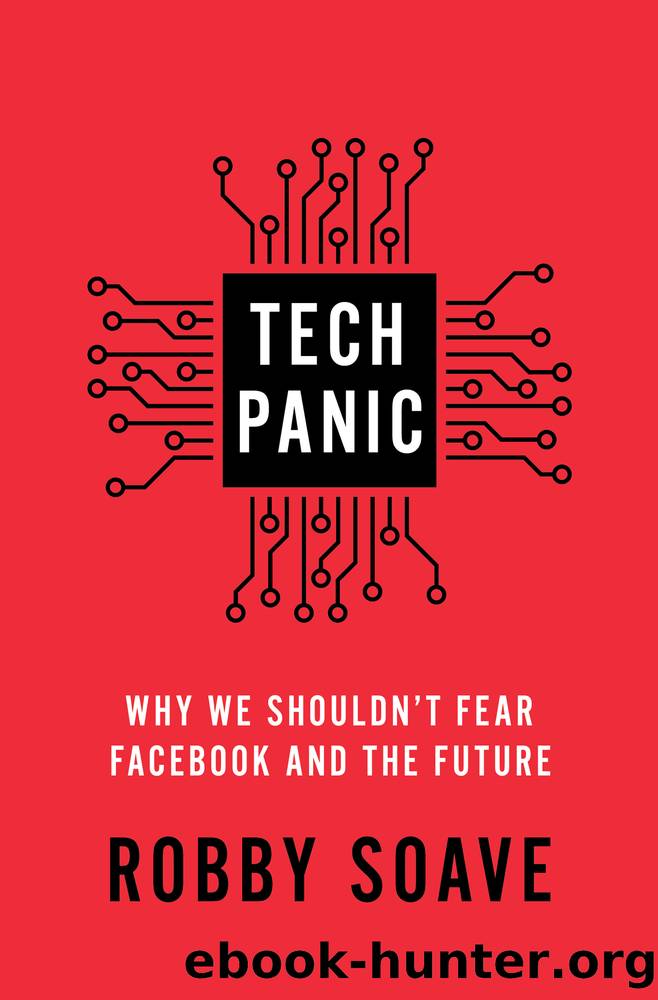Tech Panic: Why We Shouldn't Fear Facebook and the Future by Robby Soave

Author:Robby Soave [Soave, Robby]
Language: eng
Format: epub
Tags: Social Science, Technology Studies, political science, Public Policy, Science & Technology Policy, Business & Economics, Industries, Computers & Information Technology
ISBN: 9781982159610
Google: Bt4YEAAAQBAJ
Publisher: Simon and Schuster
Published: 2021-09-28T23:19:28.004953+00:00
UNFRIENDED
Itâs possible to be concerned about screen addiction without being paranoid about it. Indeed, itâs wise. Yet the proposed legislative remedies significantly overstate the dangers while offering unworkable and possibly unconstitutional solutions.
Take the Social Media Addiction Reduction Technology (SMART) Act, which was introduced byâsurprise!âSenator Josh Hawley (RâMo.) in July 2019. The bill would prohibit social media companies from utilizing several features, including infinite scroll. Infinite scroll, in use on Twitter and Facebook, means that more content is always loaded as a user browses; thereâs no need to hit the refresh button, or click to an additional page. (The inventor of this feature, Aza Raskin, deeply regrets itâhe is one of the tech skeptics interviewed in The Social Dilemma.)11 Hawleyâs bill would also make it illegal for social media platforms to automatically play music and videosâlike when an embedded YouTube video begins playing on Twitter as soon as the user encounters itâwhich is another common, modern feature. (This wouldnât apply to advertisements, though.) âStreakâ badgesâwhich are awarded by Snapchat to users who send messages to each other on consecutive daysâwould also face the axe under Hawleyâs bill.
The legislation goes even further: Social media companies would be required to create a feature that automatically kicks users out of the platform every thirty minutes. This would be the new default, and though users would be allowed to manually disable it, they would have to do so again every month.
âThe business model for many internet companies, especially social media companies, is to capture as much of their usersâ attention as possible,â the bill reads. âTo achieve this end, some of these internet companies design their platforms and services to exploit brain physiology and human psychology. By exploiting psychological and physiological vulnerabilities, these design choices interfere with the free choices of users.â
Thatâs one way of looking at the matter, though one could make an equally if not more compelling case that it is this very legislation that interferes with the free choice of users by telling them which features they are permitted to use. Indeed, this is the general problem with Hawleyâs approach to tech issues, which presumes that the government should be the final decision maker rather than private companies and their customers. The Federal Trade Commission, a vast government bureaucracy, would be charged with ensuring compliance with the SMART Act, and the Department of Health and Human Services would be empowered to propose new rules to prevent the exploitation of âhuman psychology or brain physiology.â Thatâs a fairly broad mandateâwhat precisely constitutes exploitation of human psychology?âand one that could give the government vast new powers to restrict social media companies in undesirable ways.
Recall that this legislation has been proposed despite the lack of any real solid scientific evidence suggesting a link between social media and psychological problems. âThe literature is a wreck,â Anthony Wagner, chair of the psychology department at Stanford University, told Voxâs Brian Resnick. âIs there anything that tells us thereâs a causal link? That our media use behavior is actually
Download
This site does not store any files on its server. We only index and link to content provided by other sites. Please contact the content providers to delete copyright contents if any and email us, we'll remove relevant links or contents immediately.
Zero to IPO: Over $1 Trillion of Actionable Advice from the World's Most Successful Entrepreneurs by Frederic Kerrest(4572)
Machine Learning at Scale with H2O by Gregory Keys | David Whiting(4313)
Never by Ken Follett(3957)
Harry Potter and the Goblet Of Fire by J.K. Rowling(3858)
Ogilvy on Advertising by David Ogilvy(3622)
Shadow of Night by Deborah Harkness(3368)
The Man Who Died Twice by Richard Osman(3080)
Book of Life by Deborah Harkness(2939)
The Tipping Point by Malcolm Gladwell(2925)
Will by Will Smith(2920)
Purple Hibiscus by Chimamanda Ngozi Adichie(2855)
0041152001443424520 .pdf by Unknown(2846)
My Brilliant Friend by Elena Ferrante(2831)
How Proust Can Change Your Life by Alain De Botton(2814)
How to Pay Zero Taxes, 2018 by Jeff A. Schnepper(2655)
Hooked: A Dark, Contemporary Romance (Never After Series) by Emily McIntire(2555)
Rationality by Steven Pinker(2366)
Can't Hurt Me: Master Your Mind and Defy the Odds - Clean Edition by David Goggins(2342)
Borders by unknow(2315)
